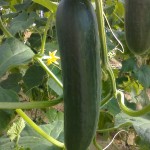Dart's Dream Farm
April 17, 2011
Homegrown Alaska
April 10, 2011
After working as a farm manager in the village of Ruby, tenant farmer, teacher, operating engineer and a roving engineer for the Department of Transportation, John Robert Dart has finally settled into doing what he loves, running his own farm in Manley Hot Springs.
Unbelievably, Dart transports his goods from Manley to Fairbanks and North Pole, a 165-mile journey. He even invested in a climate-controlled delivery truck to keep the produce and flowers fresh for his customers.

The beauty of Dart’s operation is that he takes advantage of natural hot springs in Manley to heat his greenhouse. He grows tomatoes, cucumbers, eggplants, melons, peppers, asparagus, celery, cauliflower, broccoli, Brussels sprouts, root crops and even Rhodiola, the latest horticultural rage in Alaska. It is the water in Manley that Dart credits with his ability to grow such a variety. “The sweet tepid water is why things grow so well,” Dart said. “It is high-calcium, non-sulfurous water.” Mushrooms are next on his list of things to grow.
He is starting a community supported agriculture service where customers invest in the farm and receive weekly shares. Dart hopes to provide food for 50 families. “There is interest but times are tough,” he said. His answer was to create a payment plan for those who can’t pay the full fee up front in the spring. Customers are signing up in Manley, Minto, Fairbanks and North Pole.

While his is the sole farm in Manley Hot Springs, Dart said the community has been very supportive. “People want to see farming return,” he said. “I’ve made a commitment to go green and support healthy lifestyles through locally grown food.”
He loves working for himself and having independence. “I like working with plants; I have a good eye when it comes to knowing what plants need.” He credits his uncle with teaching him about botany. “You don’t learn that overnight,” he said. “It takes a lifetime.”
Dart grew up in Minnesota, where he worked on a dairy farm as a teenager. Three days after graduating from high school he headed to Alaska to help relatives in their greenhouses and fish camps. He studied natural resources at the University of Alaska Fairbanks, then earned a bachelor’s degree in agricultural engineering technology and agriculture education at Purdue University. For graduate study he once again started at UAF, then earned teaching credentials at the University of California Davis. While at UC Davis he worked in the agriculture engineering department helping improve the safety of machinery that harvests pistachios and citrus fruit.

Teaching vocational agriculture in Oregon proved taxing, especially with a 140-mile round trip commute. Dart figured it was time to get back to Alaska. He landed a position teaching agricultural sciences and FFA at North Pole High School, where he stayed for 10 years.
Taking an about turn, Dart worked as an operating engineer, which is proving beneficial today. “My background has really helped with farming,” he said. “To have the mechanical knowledge helps solve farm problems.” He ended his public career last spring after a stint with the DOT as a roving engineer.
“My lifelong dream of starting a farm has come true,” Dart said. “I always wanted to farm but I never could afford to. I wanted to do this because it is something meaningful.”
That includes helping Alaskans become healthier. Dart is concerned about the increase of diabetes in villages. “We can help people eat better by eating fresh produce and herbs,” he said.
Dart has challenges other Alaska growers don’t, such as the havoc the 120-degree water can cause to plumbing. He uses plastic pipes to avoid corrosion. And the warmth of the soil is another concern, because it can potentially lead to diseases. He battles this problem with steam sterilization methods, never with pesticides or herbicides.
With wife Chris as his partner Dart wants to encourage his community to grow again. He hopes to create jobs for young people and support Alaska agriculture.
Next up at his farm are a cordwood summer kitchen and a new water-pumping windmill that will provide power. “I want to be a farmer’s farmer and provide low-cost transplants,” he said. “We’re in this for the long haul.”
Contact info:
www.manleyhotspringsproduce.com
Facebook Dart-AM Farms
jdart@alaska.com
This column is provided as a service by the UAF School of Natural Resources and Agricultural Sciences and the Agricultural and Forestry Experiment Station. Nancy Tarnai is the school and station’s public information officer. She can be reached at ntarnai@alaska.edu.


